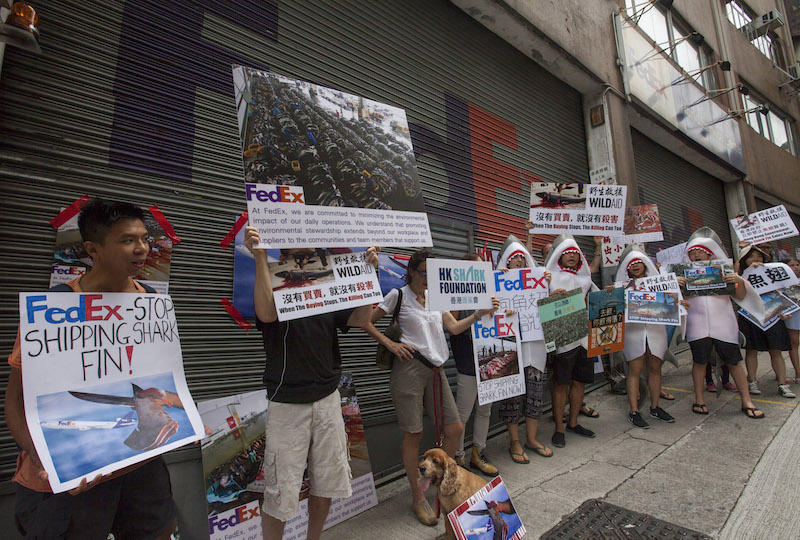
WILDAID HONG KONG SAR
HONG KONG SAR (July 3, 2016) — Activists dressed in blood-stained shark costumes demonstrated Saturday outside a Hong Kong SAR FedEx to protest the company’s continued shipments of cruel and unsustainable shark fin.
With over 100 million sharks slaughtered annually — in large part driven by consumer demand for shark fin soup in Hong Kong SAR and mainland China — many shark species are being driven towards extinction. Hong Kong SAR has accounted for half of the global shark fin trade over the past 15 years.
Though demand for shark fin soup has recently declined, FedEx has entrenched its position and has yet to respond to a global petition with nearly 300,000 signatures calling on FedEx to STOP Shipping Shark Fin. The carrier’s stance puts it at odds with a growing number of companies that have adopted shark fin free policies: 36 global commercial airlines have now banned shark fin shipments, as have 16 out of 20 worlds largest container shipping lines. FedEx’s primary competitor, UPS, banned such shipments last August in response to significant pressure from conservation groups including WildAid.


“Logistics companies like FedEx provide critical links in a long supply chain from the illegal fishing boats in far away oceans to the mouths and throats of Hong Kong SAR consumers,” said WildAid Hong Kong SAR’s Alex Hofford. “We urge FedEx to do the right thing, and take a bold step to protect sharks – just as UPS did so in 2015, and Hong Kong SAR’s flag carrier Cathay Pacific did last month.”
Only eight shark species are regulated by the Convention on International Trade in Endangered Species of Wild Fauna and Flora (CITES), and five of these only since September 2014, yet the illegal trade in these species is rife. The discovery of CITES-listed endangered hammerhead shark fins being smuggled from Costa Rica to Hong Kong SAR inside large UPS consignments of non-CITES listed silky sharks was a scandal last year that led to UPS banning all shark fin shipments.
These same issues also present the same problem for FedEx, and as a result, it’s unclear how the company can be certain that it’s adequately enforcing CITES regulations. It’s also unclear how accurate the visual inspections by FedEx can be as part of the enforcement process. According to the UPS shark fin ban commitment statement, the potential for misidentification presented an unacceptable business condition. FedEx should also ban shark fin shipments for these same reasons.
Stay in touch and get the latest WildAid updates.
SIGN UPAbout WildAid
WildAid is a non-profit organization with a mission to protect wildlife from illegal trade and other imminent threats. While most wildlife conservation groups focus on protecting animals from poaching, WildAid primarily works to reduce global consumption of wildlife products such as elephant ivory, rhino horn and shark fin soup. With an unrivaled portfolio of celebrity ambassadors and a global network of media partners, WildAid leverages more than $308 million in annual pro-bono media support with a simple message: When the Buying Stops, the Killing Can Too.
Journalists on deadline may email communications@wildaid.org